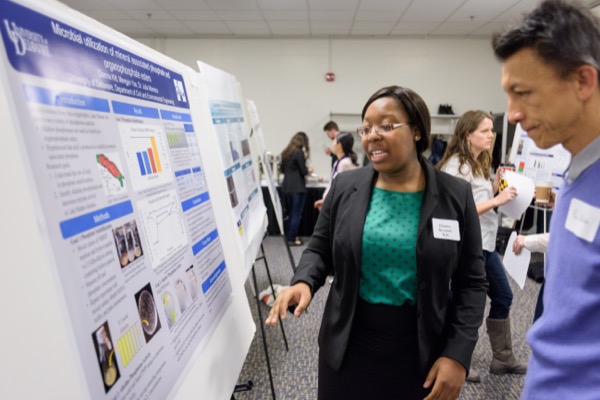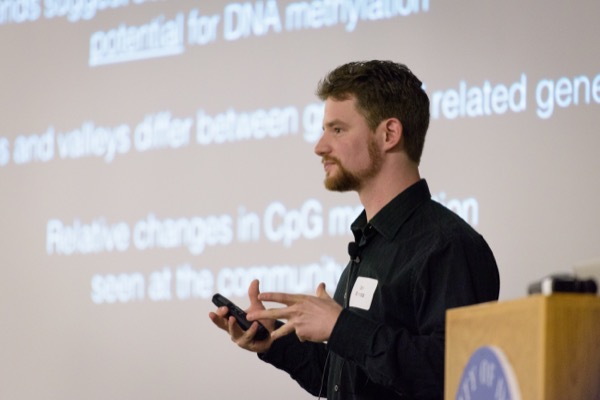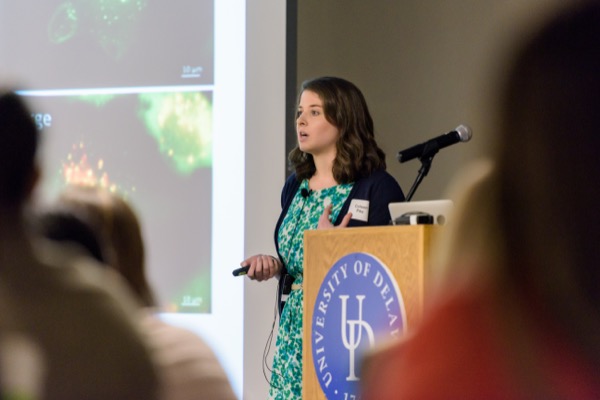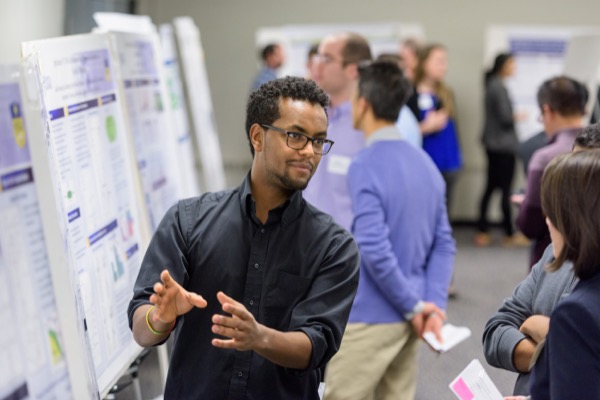All about the microbes
Researchers compare notes on amazing world of bacteria, fungi, viruses, protozoa
11:03 a.m., Feb. 10, 2016--They're out there for better or for worse, a teeming universe of microbes that influences everything that lives and breathes in this world.
They have ominous-sounding names – bacteria, viruses, fungi, algae, protozoa – but without the work of microbes life as we know it would not exist. They are critical to digestion, photosynthesis and all sorts of other biological and chemical processes.
Research Stories
Chronic wounds
Prof. Heck's legacy
But much remains unknown about what microbes do and what they are capable of doing. That was clear in the kinds of questions more than 100 University of Delaware students and researchers discussed as they shared their research at the third annual Microbial Systems Symposium held Feb. 3 at the Perkins Student Center. Consider:
• Could bacteria provide an early warning that a concrete structure has been damaged or undermined, even before the problem is visible?
• What kinds of camouflage strategies do bacteria use to get past immune system defenses?
• What happens if several kinds of bacteria are mixed in an effort to help plants?
• How does the virus that causes Marek's Disease in chickens get past the proteins that regulate the birds' defensive system?
• How do storms affect microbes in the soil near trees?
• How do the microbes in a horse's gut contribute to its health or illness?
• What strategies can prevent salmonella poisoning and improve the shelf life of green onions?
And that's only a fraction of the questions posed, conclusions presented, and future projects planned in this scientific community, which is growing in many directions across UD.
"There is lots of time to interact around these tables," Robin Morgan, chair of UD's Department of Biological Sciences, told symposium participants in her opening remarks. "It's an interesting landscape and there are a lot of things going on here. UD is really poised to soar in this field."
Because of the vast diversity in the microbial universe, the research has great significance for medicine, food security, energy, industry, the environment, and many other areas. Microbes have been harnessed to address disease – as penicillin continues to do – to break down contaminants in oil spills, and to investigate digestive disorders, to name a few examples.
Finding ways to use harmful bacteria for beneficial purposes is one of Colleen Pike's primary research interests. Pike, a second-year graduate student, has been studying the Legionella bacterium that causes Legionnaires' Disease, a potentially fatal type of pneumonia. She works in the lab of Ramona Neunuebel, assistant professor of biological sciences and coordinator of the symposium.
"I have always been interested in immunology and bacteriology," said Pike, who won the top oral presentation prize at the symposium. "So I looked for labs that study host-pathogen interactions. I really like combining microbiology with cellular biology."
Such connections are happening throughout the University, said Jennifer Biddle, assistant professor in the School of Marine Science and Policy, as UD's microbiologists confer and make use of core facilities for such work as gene sequencing and microscopy.
Biddle, whose studies focus on the microbes that live below the ocean floor, said she found new insights while reviewing a poster presented by doctoral candidate Mengyin Yao, who works in the lab of Julia Maresca, assistant professor of civil and environmental engineering. Yao's research focuses on methane production in the surface water of Lake Matano in Indonesia, one of the deepest lakes in the world.
Doctoral candidate Nikodimos Gebreselassie said he was drawn to chemical engineering because it combines math, science and problem solving – all of great interest to him. He expects the work he is doing in metabolic flux analysis in the lab of Maciek Antoniewicz, associate professor of chemical and biomolecular engineering, to contribute to advances in biofuel production.
The work of Amy Biddle, assistant professor of animal and food sciences, is of great interest to horse owners, especially those whose horses have suffered from colic or laminitis.
Horses don't adjust to dietary change quickly, Biddle said, which makes them susceptible to disease. She is studying how microbes in a horse's gut factor into its health and continues her research through the Equine Microbiome Project, which offers horse owners a low-cost analysis of the bacteria in their horse's gut.
The owner gets a kit, collects samples, and returns them to Biddle for analysis and her lab then uses those samples in its research. More than 70 sample kits have been sent out since the project started in October 2015, Biddle said.
The Microbial Systems Symposium was sponsored by several colleges and departments, including Biological Sciences, Civil and Environmental Engineering, Chemistry and Biochemistry, Chemical and Biomolecular Engineering, the Chemistry-Biology Interface Program, the Delaware Environmental Institute, COBRE, and the UD ADVANCE Institute.
"The research highlighted at the symposium made it clear that microbiology is a vibrant field of research at UD that is benefiting from interdisciplinary interactions across the campus," Neunuebel said.
Article by Beth Miller
Photos by Evan Krape














